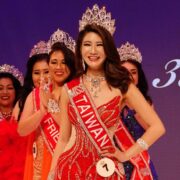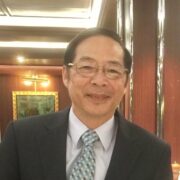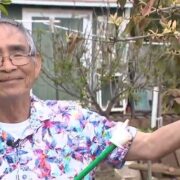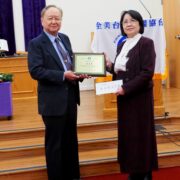Embracing Taiwanese Cultural Values
Through Philanthropy and Public Service in America
By Karen I. (Chang) Wu
Speech prepared for the
2013 Taiwanese Association of America (TAA) – New Jersey Chapter
Annual Meeting – February 23, 2013
Hillary Clinton once wrote that “Home is a child’s first and most important classroom.” I am grateful that I received my first lessons in philanthropy at home.
What exactly is “philanthropy?” The word comes from the Greek, and means “love for humanity.” It describes any actions that promote the common good and improve the quality of life for others. If you have ever donated to a charity or volunteered to serve others in your community, you have engaged in philanthropy.
What do you picture when you hear the word “philanthropy?” I see a telephone. You might be wondering, why a telephone? Well, I’d like to take you back to 1977 – New York City. My father (Morgan Chang) had finished a 4-year graduate scholarship at Columbia University and was working at a securities brokerage firm in Manhattan. My mother (Eileen Chang) had worked to pay the bills while my dad finished graduate school, and was home taking care of my older sister Gloria, who was then just two years old.
My dad volunteered his time serving as part of a committee of the New York chapter of the Taiwanese Association of America (“TAA-NY”). The committee was brainstorming ways to disseminate news about the local Taiwanese community to its members. My dad suggested using a telephone answering machine to disseminate the news. Phone hotlines were a very common way for people to obtain all kinds of information at that time. The weather hotline was, after all, how my dad figured out what to wear each day – why not apply the same concept to share interesting news with TAA members?
On May 1, 1977, this new telephone hotline, which my dad named “Voice of Taiwan” (Dai-Wan Ji-Im), began formally operating. If you called the number, you could probably tell that it was a small operation – my mom conducted interviews of local community members, my dad drafted the news, and my mom edited and recorded it. The original purpose of the hotline was to create a sense of community among Taiwanese immigrants in New York. Early news included an interview with a young Taiwanese violinist who was performing at Carnegie Hall. But right at this time, a lot of political turmoil was erupting in Taiwan, and the hotline soon became a way to share this news, first on a weekly basis, which soon became daily.
In December 1978, a random act of fearlessness propelled my parents into the center of Taiwan’s democratic movement. My mother came across the phone number for the Tangwai Island-Wide Candidates Campaign Coalition General Secretary, Mr. Shih Ming-Te, and decided to call him. They did not know each other, but after my mother explained that she was a reporter from the Voice of Taiwan in New York, he began to share detailed information about critical events taking place within the democratic movement. Information that was not generally available because Taiwan was still under martial law.
After that fateful call, Mr. Shih began providing my parents with weekly reports, including detailed accounts of illegal acts of violence happening against pro-democracy activists. As these events began happening more frequently and unexpectedly, my parents allowed Mr. Shih to make collect calls so he could share the news right away. Those calls often came in the middle of the night, which meant my parents would stay up all night writing and recording the news in order to broadcast it the very next day. There were a few times when they had to work so feverishly to get the latest news out as quickly as possible that they had to put my sister and me in another room in order to finish in time. On those occasions, you can hear the voice of children crying in the background of the recordings.
The turning point for the Voice of Taiwan came with the Kaohsiung Incident. My parents were on an international call to Taiwan just as a tear gas bomb exploded in the background. The sounds of the rally being crushed by the police were recorded and shared with fellow Taiwanese immigrants in America. The Kaohsiung Incident marked the beginning of organized political action in North America in support of Taiwan’s self-determination.
When the Voice of Taiwan began reporting political news in 1977, it was the only public source of information about Taiwan’s democratic movement. In fact, overseas newspapers even quoted from their news recordings. The program became so popular that over 40 affiliate stations were soon established, including in various cities in the U.S., Canada, Europe, and Brazil. The affiliate stations allowed people outside of the New York region to access the Voice of Taiwan’s news without having to pay for an expensive long distance or international call.
My parents paid a hefty price for operating the Voice of Taiwan. They were harassed, interrogated, under surveillance by Kuomintang secret service agents and American FBI agents, their phone line was wiretapped for 33 months. A friend of theirs even suggested that they move to Brazil temporarily to live with my uncle in safety. While I was growing up, my parents never talked much about the sacrifices they made to carry out the program, but the more I have learned, the more I have come to recognize their deep love for the people of Formosa.
For many of you who grew up in Taiwan, you also probably have a natural love for your homeland. But how do people like me, a second generation Taiwanese American born in the U.S. make that personal connection and identify with Taiwan?
I did not enter college thinking that it would be a time to learn about my Taiwanese heritage, but my days at Wellesley College turned out to be an important opportunity to learn about my identity as a Taiwanese American. I remember taking a bus into Cambridge to attend the annual Taiwanese Night Market at Harvard. My friends and I waited in a long line and paid $5 to eat lo-bah-bng, mua-ji, and other delicious Taiwanese food cooked by the wonderful women of the North American Taiwanese Women’s Association (NATWA). The event was held close to February 28th, so we took time to remember the 228 incident, and the many people whose lives were lost in the tragic massacres that occurred.
Several other schools in Boston also had Taiwanese student associations, but at the time, Wellesley did not. During my junior year, I posted a message on a public email discussion board on my campus asking if anyone would be interested in starting a Taiwanese students association. Dozens of people responded positively. By the fall of my senior year, the Wellesley College Taiwanese Students Association (TSA) became an official student organization, and I was elected co-president of TSA. That year, we organized a lecture on the consequences of the massive 921 Earthquake in Taiwan. We set up an afternoon study break to learn how to make bah-wan.
Learning about my Taiwanese culture and history made my self-identification as a Taiwanese American more meaningful. But it did not answer the big question that I had as I entered college: What am I going to do with my life??
When I entered college, I really wasn’t sure where I was headed. In 3rd grade, I wanted to be a teacher. By 6th grade, I wanted to be a stock broker. In high school, I began having an interest in law and policy issues, but I was intimidated by the more outspoken students in my class, and had determined that there was one thing I could not be – a lawyer.
But during college, I began to explore social justice issues affecting Asian Americans. I spent a summer interning at the Asian American Justice Center in Washington D.C., and became keenly aware that Asian Americans and other underrepresented communities still faced significant barriers to justice in the United States. I felt compelled to do something that would allow me to strengthen justice for all communities, but as I entered law school, I was still not sure what that meant in my life.
During law school, I looked for different experiences that would expose me to legal work promoting social justice. I came across an internship opportunity with the Community Development Project (CDP) at the Urban Justice Center. CDP’s mission is to “strengthen the impact of grassroots organizations in New York City’s low-income communities.” I was drawn by their approach to community empowerment by providing legal assistance to multiple community-based organizations that are each tackling a different structural cause of poverty – low-cost, quality health care, affordable housing, a good education. One group might be running a nonprofit community health center. Another group might be operating an after-school program for children.
My internship experience at CDP led me to explore the broader field of nonprofit law, including an internship at the Charities Bureau in the New York Attorney General’s office, where I saw how regulation and enforcement can strengthen public confidence in charities. Looking back, I can see that my parents’ community activism planted the seeds of philanthropy in my life. The different internships I participated in gave me a new framework and lens to see one unique way that social justice can be carried out. These influences eventually led me to my current law firm, where I have worked for the past 8 ½ years.
At Perlman & Perlman, we provide legal counsel to charities and companies engaged in philanthropy and social good. On a typical day, I am helping a nonprofit think through the tax implications of a new program that will provide job training and employment to individuals undergoing rehabilitation. I am outlining the steps needed to carry out a merger of two nonprofits seeking to join forces to more effectively carry out a common mission. I am explaining the rules for conducting a national fundraising sweepstakes using Facebook and Twitter. Our firm has a motto that reminds us of the greater purpose that we strive to accomplish each day: “empowering our clients to change the world.”
My work has given me a chance to observe how different communities, joined together by a common faith, race, or ethnicity, have engaged in philanthropy in America. I have been especially impressed by the depth of Jewish philanthropy in America, and seeing how their faith and moral values have driven a culture of philanthropy within their community. For example, a central Hebrew word frames the concept of philanthropy — “Tzedakah” — which refers to the acts that we call “charity”: giving aid, assistance and money to the poor and needy or to other worthy causes. In Judaism, charity is not viewed as a generous and noble act; it is simply an act of justice. The obligation to perform tzedakah can be fulfilled by giving money to the poor, to hospitals, to synagogues or to schools. It is also fulfilled in the way we take care of our family and neighbors.
In one of my work assignments, I had to review a thick stack of fragile and yellowing papers dating back to the early 1900s. The documents disclosed details regarding hundreds of donations made by Jewish immigrants to a school established to provide technical education for the Jewish immigrant community. Some of the donations were given while the donors were alive; others were fulfilled after they passed away, through bequests in their wills. I learned that Jewish immigrants began arriving in America in large numbers in the 1850’s, and saw how quickly they embraced philanthropy in America through organized giving and the establishment of charitable institutions. In the earlier years of Jewish immigration, giving focused on supporting fellow Jews, however, studies of current trends in Jewish philanthropy show that Jews today support a variety of causes, Jewish and non-Jewish. Many credit this changing pattern of giving to the integration of Jews into American society.
This experience made me stop to consider — what does philanthropy look like within the Taiwanese American community?
The Voice of Taiwan is an early example of philanthropy by the Taiwanese American community. I learned that the Voice of Taiwan was not the sole work of two people. The program cost about $1,000 per month to operate (which was more than my dad’s monthly salary at the time). International collect calls from Taiwan were the single largest monthly expense, but was the vital source of information for Taiwanese in America to understand what was happening with the democratic movement. TAA-New York helped cover the early costs of the program, including purchasing the recording equipment, but when the monthly operational costs became overwhelming, my parents began requesting voluntary donations from listeners.
Checks began to come in from all over the country. Many donations were from people they did not know at all. Most of the donations were small — between $10 – $30. Many of the donations came from recent immigrants. Many donors were still in graduate school. My dad even recalls receiving envelopes in the mail with donations of postage stamps. Letters arrived from all over the world providing encouragement to sustain them in their work. This was an example of philanthropy at its best, when everyone is invited to contribute in whatever way they are able. The Voice of Taiwan has been recognized as a part of the history of Taiwan’s democratization, but I also see it as part of the early history of Taiwanese American philanthropy.
What motivates Taiwanese American philanthropy? There are few studies focusing on our community’s philanthropy specifically. One study of giving among Taiwanese Americans found that compassion and altruism – an abiding concern for the welfare of others — are key values that motivate Taiwanese American donors. Special events motivate Taiwanese American donors to give (such as the 921 Earthquake in 1999). Donations from Taiwanese residents in the U.S. back to their homeland (a trend known as “diaspora philanthropy”) are an important part of our community’s giving. And first generation Taiwanese Americans feel that supporting causes in the U.S. is as important as giving back to Taiwan, reflecting the personal connection that Taiwanese Americans have with both countries.
A New York Times article was published this past January discussing the recent growth of Asian American philanthropy generally. It recognized that Asian cultures have a strong tradition of philanthropy, but it has typically been carried out through financial support to family members, neighbors, churches and business associations. Today, Asian Americans are slowly beginning to adopt new vehicles of philanthropy available in the United States, including community foundations, giving circles, and planned giving vehicles, and our giving as a community is beginning to be recognized by the broader community in America.
It is rare for public attention to be given to Taiwanese American philanthropy, but I think it is worth taking the time to consider – how are we, individually, in our families, and in our community, embracing our Taiwanese community values through charitable giving and service? I have been observing one example of our community philanthropy for the past five years. In 2007, my mother established Taiwan Mission Foundation, a nonprofit organization that seeks to share the love of Jesus Christ by providing and supporting charitable outreach programs to Taiwanese communities in the U.S., Taiwan, and throughout the world. TMF serves as a connector, raising funds in the U.S. to support needs in Taiwan. It provides financial and technical support to churches that are sending their members to rural areas of Taiwan to conduct English summer camps for children of poor families. It is supporting organizations in Taiwan that are organizing volunteers to go to prisons to provide inmates with prayer and encouragement. TMF is bringing the Taiwanese community in America together in the name of charity and evangelism, and its community of supporters continues to increase steadily.
Let me share with you what my own version of philanthropy looks like. It’s 8:30 on a cold Saturday morning. I take the subway to a soup kitchen in the lower east side of Manhattan. As I walk into the building, I see about 30 people lined up across the street. They wait in the freezing cold for an hour or more until the doors open, and they are welcomed inside with jubilant music, hearty handshakes, and hugs from volunteers and staff. They are ushered to a seat, and served an all-you-can-eat hot breakfast.
During breakfast, I walk around passing out fliers that say “Free Legal Advice” translated in English, Spanish, and Chinese. I wave to a Chinese woman in her 60s. She greets me with a warm smile every time I go. She watched my belly grow while I was pregnant with my daughter Isabelle. By the time breakfast is over, over 700 people have come in to receive a hot meal.
When the guests are done eating, some go upstairs, where they see about 15 to 20 volunteer lawyers sitting in pairs at desks throughout the room. We shake hands with our client, then sit down and listen to their story. We take time to identify each legal issue, and offer advice on ways to resolve their situation. Each client is treated with respect, no matter their circumstance or past. We serve anyone in need, but our motivation is grounded in a common Christian faith.
One thing that is unique about this group is that we are not focused on serving any specific ethnic population – yet half of our board members are Asian American, and almost half of our volunteers are Asian Americans.
In 2008, a handful of Christian lawyers came together and began thinking about how we could use our legal skills to serve the poor in our community. We learned that hundreds of thousands of low-income New Yorkers face civil legal problems without the advice of an attorney. These individuals – our neighbors – are unfairly evicted from their homes, denied proper wages, and terminated from their jobs without just cause. We spent several months conducting a community needs assessment, which confirmed that the needs were great, but the resources were few. We launched our new legal services program at the end of 2009, going on faith that the volunteers and the right poverty law experts would join us.
Today, Open Hands Legal Services has a wonderful Executive Director, has trained almost 200 volunteers, and is partnering with four nonprofits in Manhattan and Queens that are already serving the poor in other ways. I remember meeting with a man whose landlord ignored his repeated requests to fix the leak in his apartment roof. He decided to withhold his rent in hopes that his landlord would finally make the repairs. Instead, he was served with an eviction notice. He came to us, frustrated and angry at the injustice on top of an injustice. We advised him that he did have legal rights as a tenant, and we gave him specific steps to take that would allow him to assert his rights and resolve the situation.
Open Hands is giving our neighbors a chance to remain in their homes, overcome barriers to re-entry into society, stabilize their lives, and flourish as individuals. We challenge our friends and family to “invest” in our mission and vision for a society that seeks justice and a life of dignity for every person. This is my personal journey in philanthropy, and I’m still only at the beginning.
I asked my dad what compelled him to continue doing the Voice of Taiwan for five years, all without any pay, and all the while facing numerous challenges and threats. Was it a sense of pride for his homeland? A sense of duty to his fellow Taiwanese back home? A desire to engage in politics and change the world? He simply said, “We did it because it was the right thing to do.” My mother credits the United States in providing a free and tolerant environment which allowed them to carry out the Voice of Taiwan. Her response to “Why did you do it?” “Because in the U.S., no one will stop you.” That courageous spirit still drives her philanthropy today.
I am grateful that my life has been rooted in philanthropy. In fact, because I was born at the height of my parents’ involvement with the Voice of Taiwan, my parents gave me the Taiwanese name, Im-Im. It is a name I bear proudly. It gives me an opportunity to share the story of how my name, and in fact my life, have roots in giving voice to the voiceless.
Every day after work, I return home to a loving husband and my two young daughters. Isabelle is two years old. She is very independent but loves to be helpful. Every morning, she insists on stirring my coffee for me. Rebecca is five years old, and wants to know about everything. Mommy, why is this vegetable called an eggplant when it’s not made of eggs? Mommy, why are you going out to help poor people on Saturday morning when you were already at work all week? This is a big question for me. After working a full-time job as a lawyer, and coming home to take care of two little girls who clamor for their mom’s attention, why do I still take time out to serve someone else’s family? I will admit, it is not always an easy decision. But then I think of the man who was threatened with eviction for trying to assert his rights as a tenant. I think of my parents, who persevered for five years to give pro-democracy activists a voice, even though their efforts caused them to be blacklisted, and denied the right to return to their homeland for 17 years.
In 2006, the Wu San-lien Foundation for Taiwan Historical Materials approached my parents about transcribing and archiving their telephone hotline recordings. The archival process gave them an opportunity to write down the details of their experience, which I have read with great intensity. These stories help me remember why I continue to take time out of my busy life to volunteer. In five years, I hope to tell Rebecca and Isabelle about their family history. I hope that when my girls think about philanthropy, they will remember their parents’ story and their grandparents’ story. And I hope they will see that philanthropy is a central part of our family history. Each family’s story adds to our community’s story of philanthropy. I look forward to seeing how our story of Taiwanese American philanthropy unfolds, and am thankful for the small part I have been given to play.
###
Karen can be reached at kareniwu@yahoo.com or Karen@perlmanandperlman.com.
Source from Karen I. ( Chang) Wu
Posted on 01/11/19





